About the Matukar Dictionary
The Matukar language is spoken in two villages in the Madang province of Papua New Guinea. Native speakers of Matukar call their language "Panau," which means "give me" and is said to refer to the words of their ancestors when they first came to the island (Mowab, 2009). That their ancestors were more recent migrants than speakers of other Papua New Guinea languages in that area may be supported by the fact that Matukar is unlike the Papuan languages on the isle. It is an Oceanic language of the Austronesian family and shares cognates and similar structure with languages found on surrounding Melanesian islands, such as Samoan (Lewis, 2009) (Figure 1).
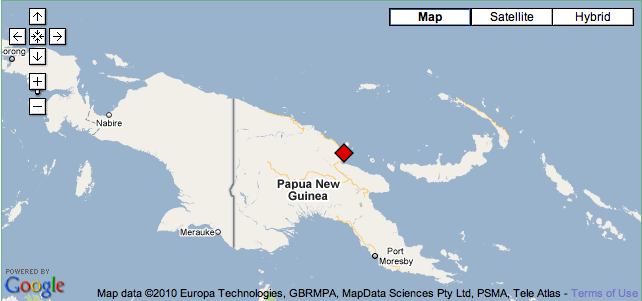 1. Matukar village is located on the northwestern coast of Papua New Guinea (WALS Online, 2008)(Google Maps).
1. Matukar village is located on the northwestern coast of Papua New Guinea (WALS Online, 2008)(Google Maps).
There are currently about 430 speakers of Matukar (Harrison, 2009). Although this number includes both young children and experienced elders, the effects of the spreading of English and the dominance of Tok Pisin, the national pidgin, puts Matukar at risk for extinction. However, through local language revitalization efforts and projects such as the Matukar Talking Dictionary, it is hoped that Matukar will become popularized among younger generations.
The Matukar Talking Dictionary was compiled in 2009-2011 by Danielle Barth, Gregory D. S. Anderson, and K. David Harrison. It includes basic vocabulary, verb paradigms, and sentence structures in Matukar with corresponding translations in English and Tok Pisin. The accompanying sound files were recorded in Matukar village and feature expert speakers Kadagoi Rawad and Joe Mowab along with John Agid. Because Matukar is situated in a rural part of coastal Papua New Guinea, ambient sound noises, including those of insects, livestock, and birds, may be heard.
We would like to thank all the Matukar language consultants for their cooperation and contributions. The research for this dictionary was made possible by the support and assistance of the National Geographic Enduring Voices Project, the Living Tongues Institute for Endangered Languages, and Swarthmore College. All content is under copyright by the authors. Words and recordings remain the intellectual property of the speakers and community. Any questions or comments concerning this project can be sent to talkingdictionary@swarthmore.edu.
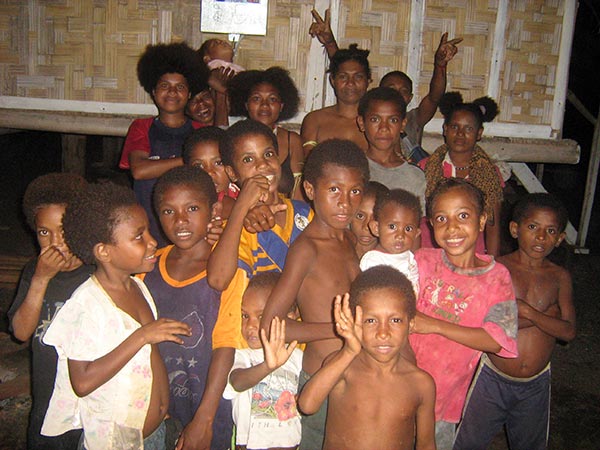 2. Young children from Matukar village. Photo by Danielle Barth.
2. Young children from Matukar village. Photo by Danielle Barth.
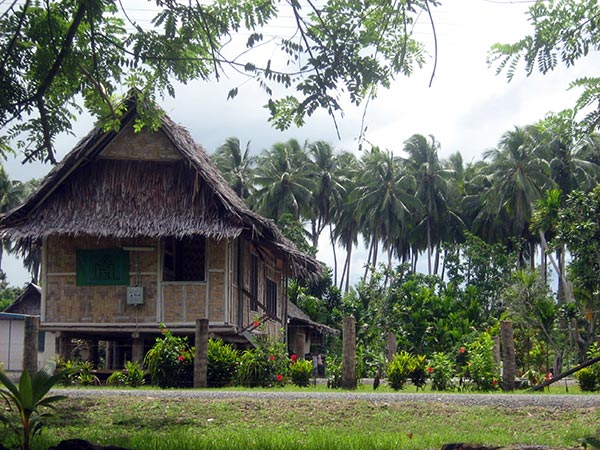 3. Traditional Matukar thatched roof house. Photo by Danielle Barth.
3. Traditional Matukar thatched roof house. Photo by Danielle Barth.
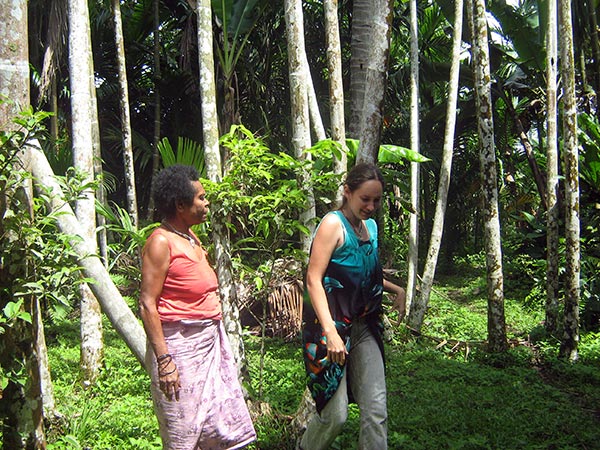 4. Kadagoi Rawad (left) and Danielle Barth (right).
4. Kadagoi Rawad (left) and Danielle Barth (right).
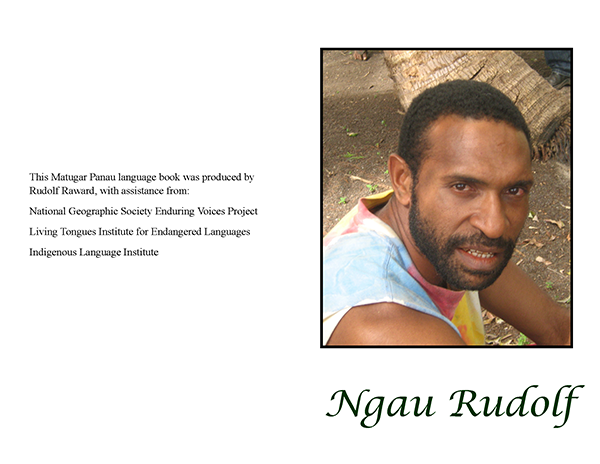
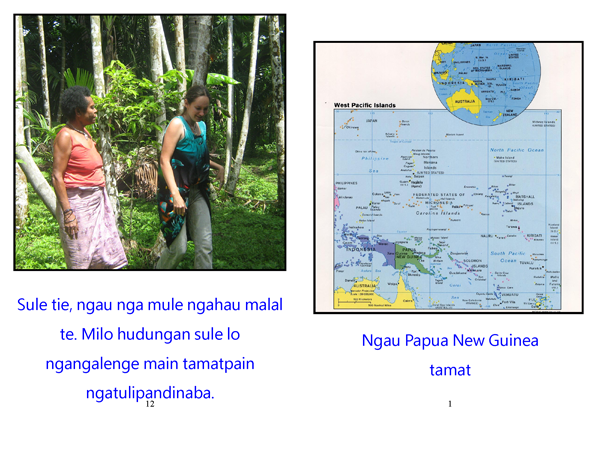
The first book in Matugar was written by Rudolf Raward in April 2010, while at the Language Revitalization Workshop in Santa Fe, New Mexico, hosted by the Living Tongues Institute. Rudolf, who is from Matukar village, explains that, "It is important to speak the language because it keeps our identity. I don't look like a Matukar person physically, but if I speak Panau then it tells people I'm from my place." Working with K. David Harrison and Greg Anderson, he devised an orthography for the language based on the Latin alphabet. Raward then wrote of his visit to the United States to attend language revitalization workshops held by the Living Tongues Institute. Raward hopes to continue the efforts in language revitalization by producing more literature and media in Matukar, as well as recording cultural linguistic traditions found in Matukar song and ceremonies. For a transcript and PDF of Raward's book, as well as a video of him reading it, see below.
Translation of Ngau Rudolf
(Panau) Ngau Rudolf
I am Rudolf
(Panau) Ngau Papua New Guinea tamat
I'm from Papua New Guinea
(Panau) Ngahau malal dabok yangan Madang.
My big town is Madang
(Panau) Ngahau malal natun yangan Matugar.
My small village is Matugar.
(Panau) Ngahau nen nga meninge, tibud hadi malal te ngago.
I left my mother and I will travel to the white man's place.
(Panau) Tamatpain hudungan dibude nigeuwai ditame.
Men and women together came and cried for me.
(Panau) Ngahau malal natun ngameninge, tibud hadi malal daboka ngawe.
I left my small village and traveled to the white-mans' place.
(Panau) Tibud hadi malalte ngasuse, milomilo do tamatpain kasik ngaitadine.
I arrived in the white-mans' place, I saw many things and many men and women.
(Panau) Tibud hadi malal yangan Santa Fe te ngasuse. Manaya sule lo ngawe.
I arrived at the white man's place called Santa Fe. There I attended training.
(Panau) Sule ta yangan Living Tangs Institut te milomilo kasik dipitenganauwe.
At the Living Tongues Institute I learned many things.
(Panau) Nal hudungan sule aloa, ngam hudungan milo aben te ngamadop milo ngamaningokai.
At the end of every class, together we have dinner at restaurants.
(Panau) Tidom ta ngam tahaiktahaik ngahamam malal wai ngam gamuke, ngahamam nang wai ngamgamuke.
One night each of us talked of our place, we talked about our language.
(Panau) Sule tie, ngau nga mule ngahau malal te.
Finally, I came back to my village.
(Panau) Milo hudungan sule lo ngangalenge main tamatpain ngatulipandinaba.
I'll tell everyone the things I learned from school.
References
Cysouw, Michael. (2008). Matukar. In: Haspelmath, Martin & Dryer, Matthew S. & Gil, David & Comrie, Bernard (eds.) The World Atlas of Language Structures Online. Munich: Max Planck Digital Library, chapter 39. Retrieved from http://wals.info/languoid/lect/wals_code_mtk.
Harrison, K. D., Anderson, G. (2009). Enduring Voices-Papua New Guinea, July-August 2009 [PDF document]. Living Tongues Institute for Endangered Languages. Retrieved from http://www.nationalgeographic.com/mission/enduringvoices/pdfs/PNG_final_3-email.pdf
Lewis, M. Paul (ed.). (2009). Ethnologue: Languages of the World, Sixteenth edition. Dallas, Tex.: SIL International.
Mowab, Joe. (26 July 2009). Personal Communication - Matukar-Panaw Sound Files.